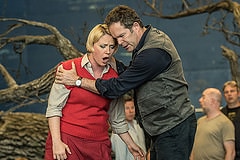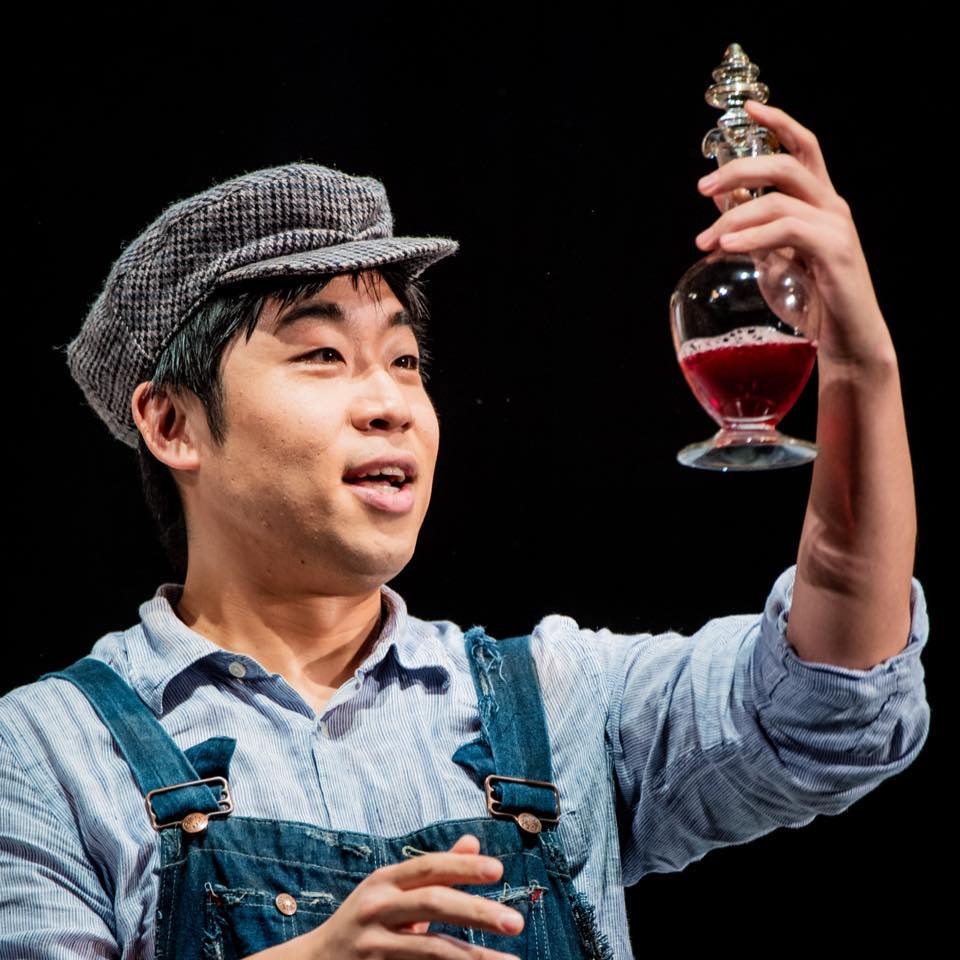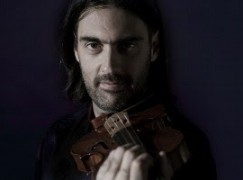Advice to Covent Garden: Make it shorter
mainHere’s the warning letter the ROH has sent ut to all who have bought tickets for William Tell. Too long by half?
We are writing to you as you have booked a ticket for Rossini’s Guillaume Tell. You might be aware of very strong public reactions to a scene in this production in the third act where there is a depiction of a young woman being attacked and sexually humiliated by a group of officers.
We want to assure you and your guest/s that the public reaction to this scene has been of great concern to us and we take it very seriously. For this reason, we also wanted to make sure that you had a warning in advance of watching the show, that you would be seeing a scene depicting momentary nudity and violence of a threatening sexual nature.
We feel that the scene in question is not gratuitous but is founded in the libretto of the opera and in the context of the overall action of the piece. In the first act of the opera, we hear that a father has had to violently defend his daughter, resorting to murder, against an attempted abduction by an Austrian officer. In the third act the libretto suggests a brutal domination of the Swiss women by the Austrian military.
The production tries to convey the horrible reality of warfare. A tragic fact of war around the world is that women are sexually attacked and violated, and the director wanted to shine the spotlight on this and express disgust for such behaviour and any kind of sexual violence. It is made clear in the production that it is an act of brutality and inhumanity that is indefensible, and the hero Guillaume Tell intervenes to save the girl who is attacked, at the risk of his own and his son’s life.
As mentioned, the reactions have made a deep impact on us. It has never been our intention to offend members of our audience, but for the scene to prompt reflection on the consequences of such terrible crimes on their victims. However, we are aware that some audience members might not want to be exposed to a depiction of sexual violence in this way, and so we are writing to you to make sure you feel properly warned about this short scene in act 3 in advance of watching the production.
I do hope that our production of Guillaume Tell will still make a strong impression on you in a good way.






Yes, how dare they give context and a coherent explanation?
It seems a very cogent explanation. Am not sure what the problem is here !
The explanation is based upon entirely wrong premises. Well, they can’t turn back the clock and make their choice of producer undone.
Key phrase:
” We feel that the scene in question is not gratuitous but is founded in the libretto of the opera and in the context of the overall action of the piece. “
In the words of the Duke of Wellington:
“If you believe that, you will believe anything.”
And for those who have been warned and decide not to attend, even though they may have purchased tickets many months ago in the expectation of seeing and hearing a rarely performed masterpiece, the ROH view is basically “Screw you! We have taken on board the criticism, are deeply humbled by it, but the offending scene stays in.”
The assumption seems to be “come along, but shut your eyes at the appropriate point.” No word of money back for those deeply annoyed at such shenanigans.
What a load of sanctimonious crap.
Why was there no warning given about the production BEFORE the booking opened. There was nothing to warn us in About the House, the Friends of CG, magazine.
Yes, of course there are some horrible things going on around the world, but I, and I am sure many others, like to go to concerts and operas for the pleasure of the music and for a short time forget about the problems in the outside world.
We do not expect to have the odious and idiotic ideas of some unknown producer, ramming them down our throat.
If the ROH and in particular, Kaspar Holten, are too thick and stupid to understand this, then perhaps they need some new staff.
Please Brussels, can’t you have Holten back because so far, with the exception of King Roger, he’s been a complete waste of space.
Wait,this can be an interesting debate about the role of art.
Is art a tool to increase awareness,is art a drug to make you forget about the ugly world?
Think famous paintings,Picasso.
By all means, let’s have such a debate.
No one expects to book tickets for The Rape of Lucretia and watch a rom-com starring Hugh Grant and Julia Roberts.
A good case could be made for the seduction of Donna Anna and Zerlina in Don Giovanni to be presented respectively as statutory rape and rape barely avoided.
Likewise, it could be shown, not just intimated, that Conte Almaviva was a habitual perpetrator of ius primae noctis before condescending to abolish it.
These would be legitimate interpretations of the libretto’s text, context and subtext. Vitally, such interpretations would dovetail with the dramatic import of the music.
Nothing, in Rossini’s Guillaume Tell, warrants in my opinion the wanton addition of the disputed scene. The ROH pretends otherwise. So far, to my knowledge, they have not produced anything beyond empty phraseology and platitudes. Let them make their case by offering a real analysis of the libretto and the music. If they succeed, they will convince, for the debate will boil down to divergent interpretations. As it stands, their claim about the rape scene being anything but gratuitous and unwarranted is exorbitant. Exorbitant claims require strong evidence, otherwise they can be dismissed without further ado.
PDQ. Bach is absolutely correct. I don’t think that the ROH has a leg to stand on. Have you noticed that in KH’s first letter to Catharine Rogers, he mentions the ‘attempted rape’ being discussed (please note; not acted out) in Act One of the libretto. I pointed out that the word ‘enlever’ translates as ‘abduct’ and since then KH has changed his wording and the word ‘rape’ is no longer used.
The whole production was dire and we have yet to be told where undressing and bathing very young children on stage features in the libretto.
Except, ironically, the one that is never shown in ‘The Rape of Lucretia’ is the actual rape. In fact, as Fiona Shaw pointed out the other day, it’s deliberately not made clear whether Lucretia does or does not consent.
The bottom line is, as Tim Walton points out, that a warning should have been issued before booking opened.
On another (if somewhat fussy) note, I find it silly that the ROH and Mr. Holten are finally issuing a warning, just to use such innuendo to describe the content of the scene in question; instead of using such expressions as “sexually humiliated” or “violence of a threatening sexual nature”, let us call it for what it is…rape.
“The production tries to convey the horrible reality of warfare.” Thank you. I am such a jerk who never watches the news and has no idea what’s happening out there. Thanks really. Now I know I can cancel my subscription to the Times and go to Covent Garden to at last no the real reality of the world we live in. Thank you. THANK YOU !
FIORDILIGI
(tremando)
Giusto ciel!
The libretto states that Fiordiligi is shaking. She is also looking (up) at the sky. So one can plausibly argue that Mozart and Da Ponte intended to show Fiordiligi on her back having been raped. Yeah right.
Well, Robbins Landon equated “Cosi” with Choldero de Laclos’ “Les Liaisons Dangereuses”.
I strongly agree with those who find these justifications ludicrous, and intellectually infantile.
Many serious arguments have been addressed here to Mr Holten and to everyone responsible for his sad affair.
So far, the answer is silence.
“In the third act the libretto suggests a brutal domination of the Swiss women by the Austrian military.” The stage directions state that the soldiers force the women to dance, which does seem a bit feeble. On the other hand, my dominant impression on listening to this opera is of its lyrical beauty so that extreme violence would seem to clash with it. However, without having seen the production, I wouldn’t condemn the director out of hand.
In Holten’s defense, at least they weren’t the usual, predictable Nazis.
With Holten’s one track mind, would he know the differnce
There have been several comments statements that warnings should have been given when tickets were being purchased. Isn’t it the case that often tickets are on sale long before new productions go into rehearsal so perhaps this (significant) detail of the staging wasn’t know when booking opened?
An Opera house has to know the basis of the planned production BEFORE they agree to put on that persons production.
It has nothing to do with rehearsal schedules.
Get over yourselves. Enjoy it subjectively and open your minds to a new perspective of an amazing piece. The ROH didn’t write it to offend anyone intentionally. Stop taking this as a personal attack. PC brigade – let. It. Go. If you don’t think it’s suitable then don’t go and see it. Just stop the incessant whinging about how awful the ROH is and how offended you all are. Sometimes art does shock. For better or worse. Again, Get. Over. It. and, Get. Over. Yourselves.